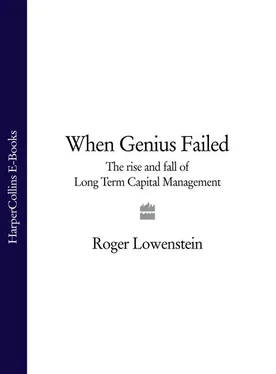That was the second happy circumstance: the professors had a protector who shielded them from company politics and got them the capital to trade. But for Meriwether, the experiment couldn’t have worked; the professors were simply too out of place. Hilibrand, an engineer’s son from Cherry Hill, New Jersey, was like an academic version of Al Gore; socially awkward, he answered the simplest-seeming questions with wooden and technical—albeit mathematically precise—replies. Once, a trader not in the Arbitrage Group tried to talk Hilibrand out of buying and selling a certain pair of securities. Hilibrand replied, as if conducting a tutorial, “But they are priced so egregiously .” His colleague, accustomed to the profane banter of the trading floor, shot back, “I was thinking the same thing—‘egregiously’!” Surrounded by unruly traders, the arbitrageurs were quiet intellectuals. Krasker, the cautious professor who built many of the group’s models, had all the charisma of a tabletop. Rosenfeld had a wry sense of humor, but in a firm in which many of the partners hadn’t gone to college, much less graduate school at MIT, he was shy and taciturn.
Meriwether had the particular genius to bring this group to Wall Street—a move that Salomon’s competitors would later imitate. “He took a bunch of guys who in the corporate world were considered freaks,” noted Jay Higgins, then an investment banker at Salomon. “Those guys would be playing with their slide rules at Bell Labs if it wasn’t for John, and they knew it.” 9
The professors were brilliant at reducing a trade to pluses and minuses; they could strip a ham sandwich to its component risks; but they could barely carry on a normal conversation. Meriwether created a safe, self-contained place for them to develop their skills; he adoringly made Arbitrage into a world apart. Because of Meriwether, the traders fraternized with one another, and they didn’t feel the need to fraternize with anyone else.
Meriwether would say, “We’re playing golf on Sunday,” and he didn’t have to add, “I’d like you to be there.” The traders who hadn’t played golf before, such as Hilibrand and Rosenfeld, quickly learned. Meriwether also developed a passion for horses and acquired some thoroughbreds; naturally, he took his traders to the track, too. He even shepherded the gang and their spouses to Antigua every year. He didn’t want them just during trading hours, he wanted all of them, all the time. He nurtured his traders, all the while building a protective fence around the group as sturdy as the red board fence in Rosemoor.
Typical of Meriwether, he made gambling an intimate part of the group’s shared life. The arbitrageurs devised elaborate betting pools over golf weekends; they bet on horses; they took day trips to Atlantic City together. They bet on elections. They bet on anything that aroused their passion for odds. When they talked sports, it wasn’t about the game; it was about the point spread.
Meriwether loved for his traders to play liar’s poker, a game that involves making poker hands from the serial numbers on dollar bills. He liked to test his traders; he thought the game honed their instincts, and he would get churlish and threaten to quit when they played poorly. It started as fun, but then it got serious; the traders would play for hours, occasionally for stakes in the tens of thousands of dollars. Rosenfeld kept an envelope stuffed with hundreds of single bills in his desk. Then, when it seemed that certain bills were cropping up too often, they did away with bills and got a computer to generate random lists of numbers. The Arbitrage boys seemed addicted to gambling: “You could never go out to dinner with J.M.’s guys without playing liar’s poker to see who would pick up the check,” Gerald Rosenfeld, Salomon’s chief financial officer, recalled. Meriwether was a good player, and so was Eric Rosenfeld (no relation), who had an inscrutable poker face. The straight-arrow Hilibrand was a bit too literal. He was incapable of lying and for a long time never bluffed; mustachioed and eerily intelligent, he had a detachment that was almost extrahuman. Once, when asked whether it was awkward to have a wife who worked in mortgages (which Hilibrand traded), he answered flatly, “Well, I never talk to my wife about business.”
The Arbitrage Group, about twelve in all, became incredibly close. They sat in a double row of desks in the middle of Salomon’s raucous trading floor, which was the model for the investment bank in Tom Wolfe’s The Bonfire of the Vanities. Randy Hiller, a mortgage trader in Arbitrage, found its cliquish aspect overbearing and left. Another defector was treated like a traitor; Meriwether vengefully ordered the crew not to even golf with him. But very few traders left, and those who remained all but worshiped Meriwether. They spoke of him in hushed tones, as of a Moses who had brought their tribe to Palestine. Meriwether didn’t exactly return the praise, but he gave them something more worthwhile. His interest and curiosity stimulated the professors; it challenged them and made them better. And he rewarded them with heartfelt loyalty. He never screamed, but it wouldn’t have mattered if he had. To the traders, the two initials “J.M.”—for that was his unfailing sobriquet—were as powerful as any two letters could be.
Though he had a private office upstairs, Meriwether usually sat on the trading floor, at a tiny desk squeezed in with the others. He would chain-smoke while doing Eurodollar trades, and supervise the professors by asking probing questions. Somehow, he sheathed great ambition in an affecting modesty. He liked to say that he never hired anyone who wasn’t smarter than he was. He didn’t talk about himself, but no one noticed because he was genuinely interested in what the others were doing. He didn’t build the models, but he grasped what the models were saying. And he trusted the models because his guys had built them. One time, a trader named Andy who was losing money on a mortgage trade asked for permission to double up, and J.M. gave it rather offhandedly. “Don’t you want to know more about this trade?” Andy asked. Meriwether’s trusting reply deeply affected the trader. J.M. said, “My trade was when I hired you.”
Meriwether had married Mimi Murray, a serious equestrian from California, in 1981, and the two of them lived in a modest two-bedroom apartment on York Avenue on the Upper East Side. They wanted children, according to a colleague, but remained childless.
Aside from Mimi, J.M.’s family was Salomon. He didn’t leave his desk even for lunch; in fact, his noontime was as routinized as the professors’ models. Salomon did a china-service lunch, and for a long time, every day, a waiter would waft over to Meriwether bearing a bologna sandwich on white bread, two apples, and a Tab hidden under a silver dome. J.M. would eat one of the apples and randomly offer the other to one of the troops as a sort of token. The rest of the gang might order Chinese food, and if any sauce leaked onto his desk, J.M., his precious territory violated, would scowl and say, “Look, I guess I’m going to have to give up my desk and go back to my office and work there.”
A misfit among Wall Street’s Waspish bankers, J.M. identified more with the parochial school boys he had grown up with than with the rich executives whose number he had joined. Unlike other financiers in the roaring eighties, who were fast becoming trendy habitués of the social pages, Meriwether disdained attention (he purged his picture from Salomon’s annual report) and refused to dine on any food that smacked of French. When in Tokyo, he went to McDonald’s. Ever an outsider, he molded his group into a tribe of outsiders as cohesive, loyal, and protective as the world he had left in Rosemoor. His cohorts were known by schoolboy nicknames such as Vic, the Sheik, E.R., and Hawk.
Читать дальше












